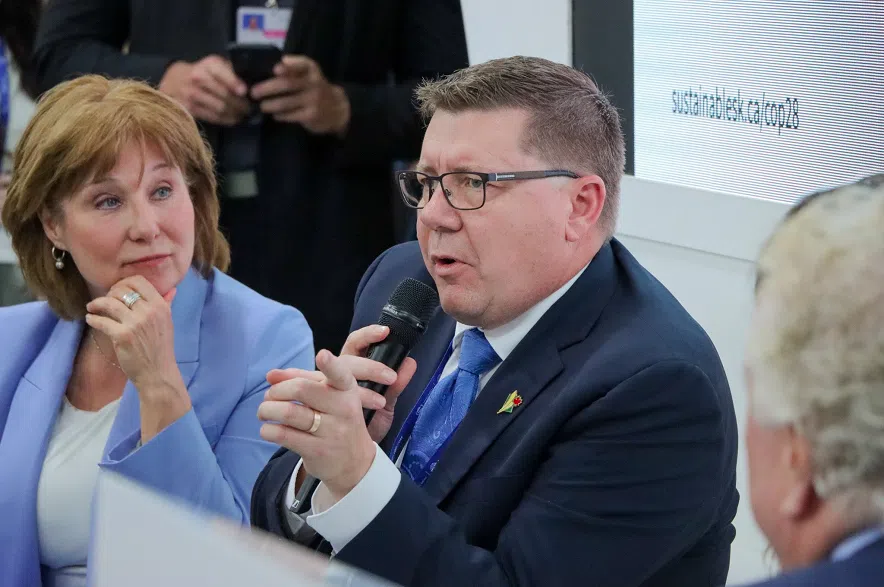Fresh from his trip to Dubai to partake in COP28, the 2023 United Nations climate-change conference, Saskatchewan’s premier said the province established relationships and agreements that should bear fruit in as little as three months.
Speaking about Saskatchewan’s relationship with the United Arab Emirates, Scott Moe told Evan Bray on Wednesday morning that the province will soon see movement.
“I think over the next three to nine months, you are going to see some of the strengths of that relationship coming to fruition in the province on a number of different fronts,” Moe said.
Despite the $765,000 the provincial government spent to attend the climate conference and $238,000 spent advertising Saskatchewan’s pavilion, Moe said he felt the province – and Canada as a whole – was well-served by that investment, though he said the government wouldn’t likely make the same investment every year.
“It was worthwhile just by what we’ve seen come out at the closing of the COP, with some of the work that was done in the uranium space, some of the (memorandums of understanding) that were signed,” Moe said.
Moe referenced a nuclear deal that was inked during the visit, as well as a new partnership between the Saskatchewan government and Bayer Crop Science – one of the world’s leading and largest agricultural organizations – which the premier said was originally meant for the federal government.
Further, Moe said the Saskatchewan delegates at the conference were able to meet and have discussions with counterparts from countries around the world.
“I think we really were able to further a number of relationships,” Moe said.
“I know that you will see, by spring, an additional delegation from the United Arab Emirates – a business designation, potentially even some investment folks involved in that – on the ground in Saskatchewan.”
Defending the out-of-province organizations that were part of the government’s Dubai delegation, Moe said connections to the other organizations, requests by Saskatchewan bodies for partnership opportunities and general goodwill led the government to extend Saskatchewan’s pavilion space to other Canadians.
Speaking to the news Wednesday morning that nearly 200 countries had agreed to a groundbreaking deal to transition away from fossil fuels at COP28, Moe said the agreement is simply a notional statement.
“It’s nothing more than just that,” the premier told Bray.
Moe said Steven Guibeault, Canada’s environment minister, does not have the authority to make the agreement, as fossil fuels fall under provincial jurisdiction.
Moe also questioned who is going to assume the costs associated with phasing out fossil fuels, calling the agreement a “notional statement at best” that doesn’t really hold water.
The premier said the reality of the situation will play out on the ground in Saskatchewan’s communities and communities around the world.
Moe said some meaningful moves were made at COP28.
An impactful statement to come out of the conference, in Moe’s view, was an agreement signed by 24 countries to triple their nuclear power footprints. Canada was one of the countries to sign, Moe said, giving credit to the federal ministers responsible.
“That actually is an action that will provide for emissions reductions,” Moe said, comparing the emissions coming from a nuclear power plant to those coming from a coal-fired power station.
The premier said he was pleased to bring Saskatchewan’s story on oil, agricultural products, uranium and nuclear resources to the world during the conference.
“I think Saskatchewan’s footprint at the conference was significant,” he said.
“Things went better than I even thought they would.”
Moe explained to Bray that his trip to the United Arab Emirates a year and a half ago resulted in a conversation about bringing the oil industry to COP, as it had previously been excluded. Moe said he pledged at the time that the province would do what it could to bring its own industries – oil included – to the conference this year.
Touting climate progress by Saskatchewan’s industries, Moe told Bray the province has a net-zero oil company and the industry as a whole in the province has reduced methane emissions by 64 per cent, which he called an emissions-based record in the oil industry “unlike anywhere in the world.”
Moe also said Saskatchewan’s food and agricultural products are the most sustainably produced in the world.
Responding also to the news of the federal government’s coming oil and gas emissions cap, Moe said the timing was planned to coincide with the conference.
He said the federal government never intended to reduce energy emissions, and instead wants to phase out the industry altogether.
“That was their inclination all along,” Moe said, pointing to five federal regulations in the area – the proposed clean electricity regulations, clean fuel standard, carbon taxation, proposed rules limiting the oil and gas industry’s methane emissions and the oil and gas cap – which he charged with driving up inflation.
The full interview with Moe can be heard below.











